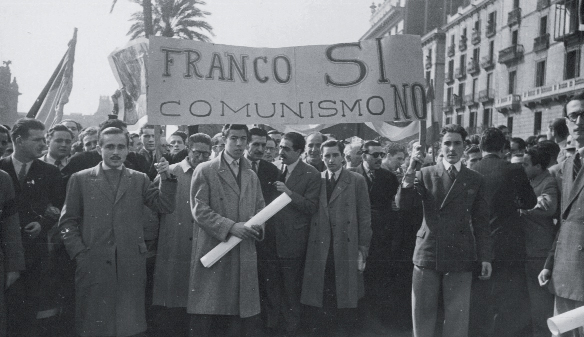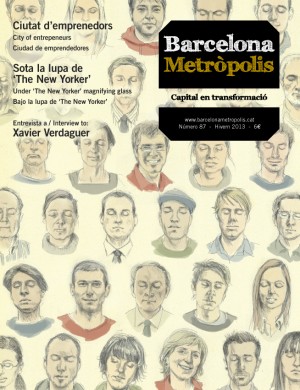The article by Marya Mannes, published in 1944, is a war article. The Allies had landed in Normandy six months previously and Paris was liberated in August. The implicit question is whether crossing the Pyrenees with the Allied army is an advisable undertaking.

© Pérez de Rozas / AFB
Demonstration in support of Franco on the Passeig Marítim, on 21 February 1946. The writer and critic Marya Mannes viewed Barcelona as a potential ally given the existence of a nation oppressed by the Spanish fascists.
The article’s topic, published in the form of a “Letter from Barcelona”, was newsworthy: at home I keep a cover of Time, also from 1944, with a map showing the Iberian Peninsula with Franco’s face superimposed, and which reads: “Franco of Iberia. An advance against him is an advance against Hitler.”
Mannes lists the virtues and the defects of the Catalans with regard to American interests. The article reeks of a Department of State report taken to the extreme: “Catalans of all groups will be in the first wave of revolt,” it concludes. And then the but kicks in: we do not know if they are serious enough. The opening paragraph makes it quite clear that Barcelona is Catalonia and Madrid is Franco, after which the article explores this dichotomy further:
“Barcelona is a long, long way from Madrid. Barcelona is Catalan and Madrid is Castilian, and the mountains that separate Catalonia from France are not as high as the invisible barrier between Catalonia and Castile. Madrid is the past and Barcelona the future of a once great nation. Like all seaports, Barcelona is a natural city, which has grown out of its geography. Madrid is an artificial city, an arbitrary capital.”
The reason why Barcelona may be an ally is the existence of an underlying nation, a nation oppressed by the Spanish fascists – the golden years of the Falangists. Any reader who had followed the World War in the American press would be conversant with this topic. The Catalans, like the French or Austrians, make for a transparent map of alliances and an inevitable conclusion.
Mannes’s Barcelona resembles Manhattan: it is portrayed as a city with contemporary art museums, numerous bookshops and well-educated and liberal people. The mysticism of Montserrat and the Mediterranean lightness of spirit “make a fine creative mould”. The Liceu hobnobs with La Scala and the Paris Opera, and the Russian ballet is a frequent visitor; Pau Casals, “the world’s greatest cellist”, is Catalan; and there is even a Japanese orchestra conductor who is a regular at the Ritz bar, where he peruses the Daily Mail. The Catalans, she says, read a lot, and since almost everything is censored, the in book is a biography of Churchill and a Mickey Mouse comic: they are just like us! Industrialists are pro-American, and everyone works harder and is more receptive to change and progress, not like in Madrid, where they live by their wits and are close minded. She mentions Destino magazine, “which has somehow managed to be pro-Ally” despite Franco, and La Cordoniz (“a completely non-political weekly that devotes itself to gags, jokes, satires, and expert cartoons”), the sole exceptions to a discursive, emotional journalism, totally dedicated to government propaganda. And even “the Barcelona girls […] walk with freedom and assurance, almost like American girls”. And she concludes: “Barcelona has, in general, an American spirit; its energy, eagerness, curiosity and humour provide a contrast to the dark, ingrowing nationalism of central Spain.”
The article goes on to focus on the injustice suffered by the city, and Catalonia with it. It voices the claim to Catalan nationalism taking precedence over Communist or Anarchist claims, and this suggests that it wants the general public to be in favour of an Allied intervention in Spain, just like Time. However, it also raises a more profound issue: the future of Barcelona is Catalonia, and the city’s power hinges on culture in its broadest sense, on its history and on its ambition, rather than on ideology.



